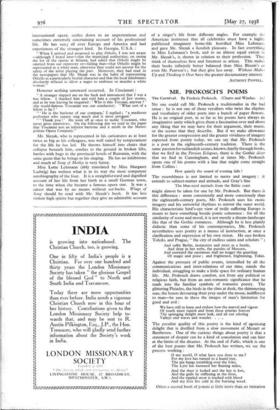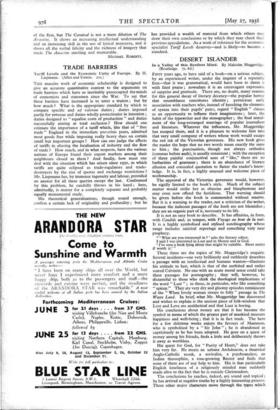MR. PROKOSCH'S POEMS
The Carnival. By Frederic Prokosch. (Chatto and Windus. 5s.)
No one could call Mr. Prokosch a traditionalist in the bad sense : he is not one of those versifiers who twist the rhythm and vocabulary of older poets into a bunch of paper flowers. He is an original poet, in so far as his poems have always an imaginative unity which gives them a fascination over and above any liking that we may have for their argument, their music, or the scenes that they describe. But if we make allowance for the greater compression and the greater vividness of imagery expected from poetry today, we can say that Mr. Prokosch is a poet in the eighteenth-century tradition. There is the
same passion for outlandish scenes, known chiefly through books, that we find in the Persian Eclogues, there is the Gothic decor that we find in Cunningham, and at times Mr. Prokosch
opens one of his poems with a line that might come straight from Collins : How quietly the sound of evening falls !
The resemblance is not limited to metre and imagery : it extends to subject-matter and attitude, and Gray's line The blue-eyed myriads from the Baltic coast
might almost be taken for one by Mr. Prokosch. But there iS
this difference : more consistently and more consciously than the eighteenth-century poets, Mr. Prokosch uses his exotic imagery and his sorrowful rhythms to mirror the outer world.
His characteristic bird's-eye view of twilit suffering Europe is meant to have something beside poetic coherence : for all the similarity of scene and mood, it is not merely a dream-landscape like that of the Gothic romances. Although he ii less plainly didactic than some of his contemporaries, Mr. Prokosch nevertheless uses poetry as a means of instruction, at once a clarification and expression of his own vision. He sees broken Toledo, and Prague, "the city of endless saints and scholars " :
And sulky Berlin, instinctive and strict as a beetle,
And deep in her webs, the puzzles of Moscow, And eastward the enormous wall no longer the guardian Of magic and poise ; and frightened, frightening, Tokio.
Against the pressure of public events, intensified by all the
communications and inter-relations of our time, stands the individual, struggling to make a little space for ordinary human life. Mr. Prokosch draws comfort, not from any political or religious faith, but from an anti-romantic significance that he reads into the familiar symbols of romantic poetry. The glittering Pleiades, the birds in the elms at dusk, the shimmering seas, the beasts devouring their prey under the moon, indifferent to man—he sees in these the images of man's limitation for good and evil :
We have still to learn and endure how the marvel and vigour Of youth must vanish and from these arteries forever The springing delight must leak, and all our adoring Valleys and waves and wonder. . . .
The peculiar quality of this poetry is the kind of agonising delight that is distilled from a slow movement of Mozart or Beethoven. One of the curious things about poetry is that a statement of despair can be a kind of consolation and can hint at the limits of the disaster. At the end of Fable, which is one of the best poems that Mr. Prokosch has written, we see the
process working :
0 my world, 0 what have you done to me ?
For my love has turned to a laurel tree,
The axe hangs trembling over the Isles, The Lyre has loosened her flaming miles, And the door is locked and the key is lost, And the gulls lie stiffening in the frost, And the rippled snow is tracked with blood And my love lies cold in the burning wood. .
Often a second book Of poimi is little more than an imitation
of the first, but The Carnival is not a 'mere dilution of The Assassins. It shows an increasing intellectual understanding and an increasing skill in the use of lyrical measures, and it shows all the verbal felicity and the richness of imagery that made The Assassins startling and memorable.
MICHAEL ROBERTS.



















































 Previous page
Previous page